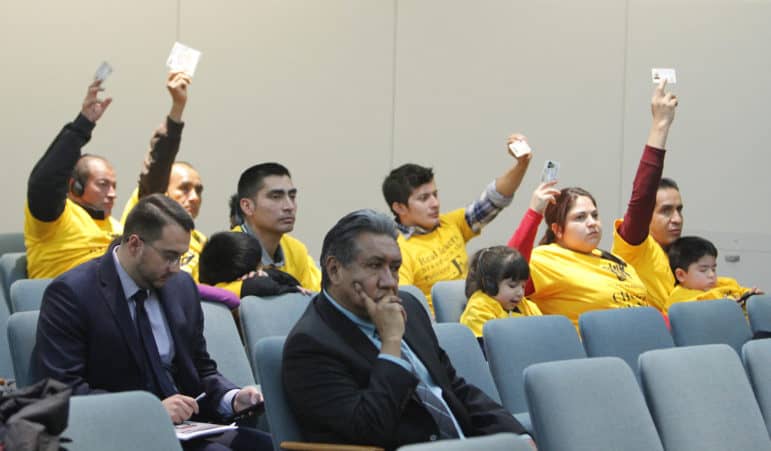
Luis Sánchez Saturno / The New Mexican
Immigrants hold up their driver’s licenses during Tuesday’s legislative debate over making New Mexico’s licenses compliant with the federal REAL ID Act. A key sticking point remaining is whether people applying for a so-called driving privilege cards — for those who don’t prove citizenship or legal status — will have to be fingerprinted.
Senate Democrats seem to have given in to Gov. Susana Martinez’s request that lawmakers pass a bill that only allows New Mexico’s immigrants without legal status to get a driving authorization card, instead of a license, in a compromise to make the state compliant with the federal Real ID Act.
For the past five years, Martinez has pushed lawmakers to pass a bill that would revoke driver’s licenses held by people who don’t prove citizenship or legal status. She said the move also would make the state compliant with the Real ID Act, a 2005 federal law that regulates identification used for federal purposes. Martinez and GOP lawmakers’ efforts have failed repeatedly, and this session Martinez is backing a measure that would allow those who don’t prove legal status to drive legally in the state after obtaining a temporary driving privilege card.
Democrats and Republicans are now closer than they ever have been to solving the issue. On Tuesday, the Democrat-controlled Senate Public Affairs Committee voted to pass along an amended version of the bill that Martinez supports, Albuquerque Republican Rep. Paul Pacheco’s House Bill 99. But there’s a sticking point: A provision requiring fingerprints of an applicant seeking a driving privilege card.
While Pacheco’s proposal calls for the fingerprinting — and Martinez has said she will veto any bill that doesn’t include it — Democrats stripped that requirement from the Senate version of the bill.
Democrats supported a fingerprint requirement earlier this year but seem to have backed away from it and are now calling it a punitive measure. Most Republicans demand such a measure, saying it will prevent fraud. They accuse Democrats of playing political games by backing out on their support for the provision.
On the other hand, Sen. Daniel Ivey-Soto, D-Albuquerque, said during a news conference Wednesday at the Capitol that Martinez “keeps moving the goal posts.”
Republicans pointed to a Jan. 7 letter to House Speaker Don Tripp, R-Socorro, that was signed by several Democrats. The letter said the lawmakers were “ready to support” some Republican proposals, including “security measures such as fingerprinting and photographing applicants.” It was signed by Senate Majority Leader Michael Sanchez, D-Belen; House Minority Leader Rep. Brian Egolf, D-Santa Fe; and Senate President Pro Tem Mary Kay Papen, D-Las Cruces.
Immigrant-rights advocates have pressured lawmakers not to add such provisions to the bill, however, because they say such procedures would discriminate against immigrants without legal status.
Three Republicans on the Senate Public Affairs Committee joined the panel’s five Democrats in an 8-1 vote Tuesday to pass the amended version of Pacheco’s bill to its next Senate committee. The amended bill would create a two-year driving-authorization card for people who don’t prove legal status. In addition to immigrants without legal status, U.S. citizens and immigrants with lawful status who don’t want a Real ID-compliant license would be able to get the card for four years.
The Democrats’ version, unlike Pacheco’s bill, would give people a choice of whether to apply for a Real ID license, if they qualify for one.
Enforcement of Real ID has for years been delayed, but some provisions took effect in New Mexico last month. For instance, residents now need a federally approved license or a passport to enter most military bases and other federal facilities. However, the federal government has said New Mexico residents won’t be barred from using their state driver’s licenses to board a domestic commercial flight until at least 2018.
The Real ID Act doesn’t require states to collect people’s fingerprints, according to the National Conference of State Legislatures, which tracks legislation across the country.
Ivey-Soto on Wednesday called the fingerprinting provision “punitive” and said the state’s Motor Vehicle Division already has technology to prevent fraud without having to collect people’s fingerprints.
“What’s the next demand going to be, and does the governor really want to resolve this?” Ivey-Soto said.
A Martinez spokesman said Wednesday that she will veto any bill that doesn’t require fingerprinting, even if it only allows immigrants without legal status to obtain driving privilege cards.
“The governor is asking for what the people of New Mexico are demanding, and that is a bill that not only ends the dangerous law that gives driver’s licenses to illegal immigrants,” Michael Lonergan said in an email, “but also provides common-sense security measures and standards that New Mexicans expect and deserve. Anything less will be vetoed.”
Lawmakers who have voted in the past to repeal the 2003 law that allows immigrants without legal status to get a state driver’s license say the amended version of Pacheco’s bill should be approved because the public wants the issue resolved.
“We are finally reaching the point where most everyone is on this same page,” said Sen. Joseph Cervantes, D-Las Cruces, in a Facebook posting Wednesday. “A two tier system has always been the one and only solution. If we don’t call them ‘licenses’ but ‘driving permits,’ the politicians who have steadfastly argued we must repeal the law entirely can now also save face.”
Contact Uriel J. Garcia at (505) 986-3062 or ugarcia@sfnewmexican.com. Follow him on Twitter @ujohnnyg.
